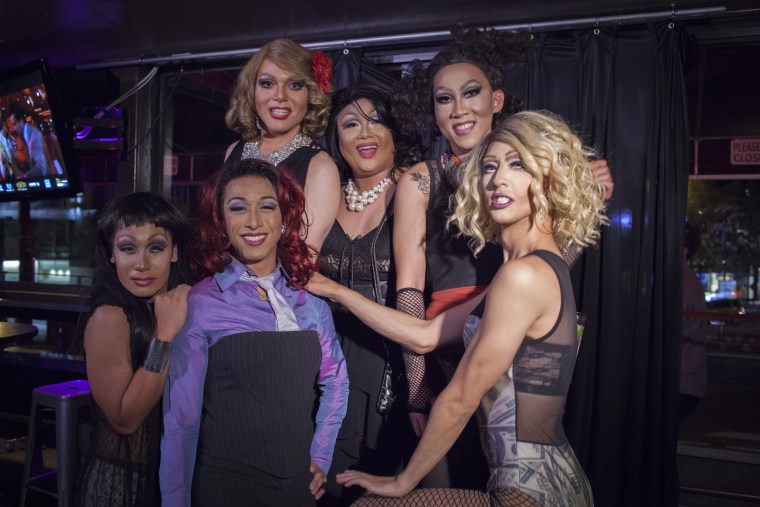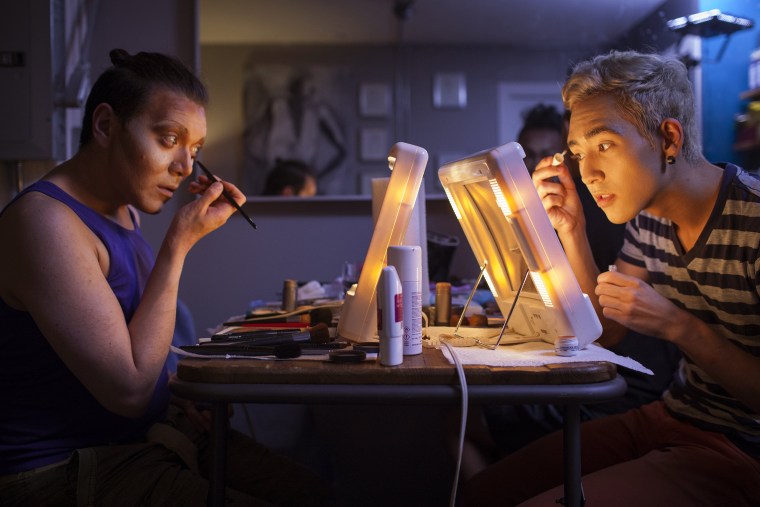Estée Longah wears a faux fur coat and a set of pearls to go with her Elizabeth Taylor-inspired white cocktail dress. She gently adjusts the flyaway curls from her wig and applies the finishing touches to her smoky eyes before a night out with the Rice Rockettes, an Asian-American drag performance troupe she founded in 2009.
When the makeup and wig are off, Estée travels as Alex (who asked to withhold his last name), a flight attendant for a U.S.-based airline company. Over the years, the journey to becoming Estée Longah has been a liberating and eye-opening experience for Alex. He’s always learning something new about the various nuances and quirks that come along with Estée--many of which crosses over to the identity he was given by birth.
“Now I can see that Estée sort of influences Alex. I’m a bit more confident as Alex. I have a better sense of who Estée is,” Alex told NBC News. “She has this whole backstory.”
Estée Longah and the Rice Rockettes
Ten years ago, Alex walked through a Nordstrom, debating an official drag name that would best encompass his identity. His eyes immediately gravitated toward a huge Estée Lauder sign. With a bit of witty word searching, it wasn’t long until Estée Longah, “an old-fashioned vintage drag queen,” made her debut in the San Francisco Bay Area.
“I was at that point where I was like, if there’s no spaces we can go, I’m going to create my own space."
Born in Guam, Alex always considered himself an introvert. Growing up, he dreamt of leaving the island where he felt anonymous and isolated for big cities where he could express himself in a creative, nonrestrictive way. He spent most of his time doodling and expressing his emotions in a journal. In one particular entry, he wrote about having feelings for a particular guy at his high school, much to the surprise of his mother.
“My mom was a typical Asian mother. She didn’t really want to deal with that sort of issue," Alex said. "And of course, being my nosy Filipino mother, she ransacked my room and found it, instead of me having to come out.”
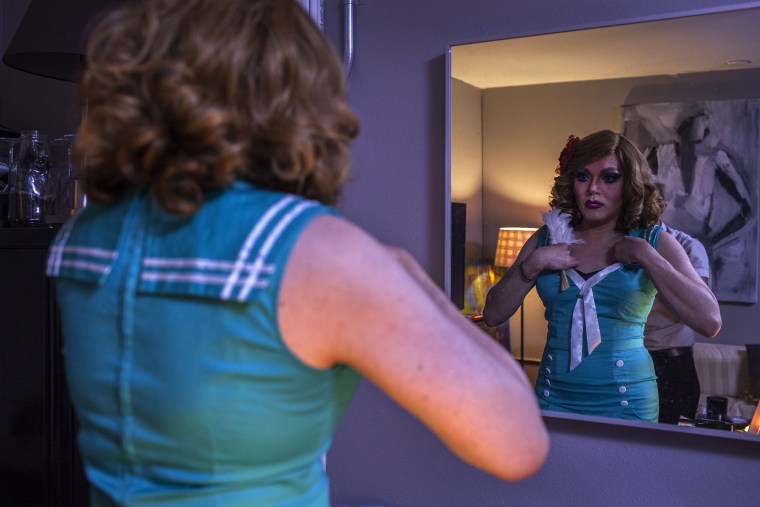
In 1999, Alex settled in downtown San Francisco and studied illustration and fine arts in college. Though he didn’t immediately fall in love with the city, he eventually found his niche, initially working as a health advocate and spreading awareness about HIV prevention and safe sex education in the LGBT AAPI community.
“In the ‘90s, there was a lot of backlash in the community because a lot of perceptions of gay Asian Americans were that they were submissive, passive, and feminine," Alex explained, adding that the idea of Asian American drag queens in the Bay Are was virtually unheard of at the time.
Yet drag was something that Alex always felt drawn to throughout his life. As a child, he looked forward to Halloween and was enthralled by the idea of an annual holiday where he could dress up without the need to feel judged or criticized. “I’ve always wanted to entertain or be on stage. I never felt like I could do it. I always felt like I’m too shy or nobody wants to see me, or I’m not good enough," he said.
By age 21, all that changed once the heels went on, and the costume changes and lights took center stage. Alex began making weekly visits to the now-closed N’Touch, one of the earliest gay Asian bars in San Francisco.
On Thursday nights, he’d watch a mesmerizing performance of a show called Club T that was put together by his "drag mother,” LGBT rights activist Tita Aida. Under a swarm of strobe lights and in the middle of a sweaty crowd, Alex said he couldn’t help but feel at home.
“I saw her show and was blown away. I thought to myself, ‘I’ve never seen Asian drag queens before,’” he recalled.
In 2005, Alex took the plunge and made his debut in drag during one of Tita Aida’s shows, “Drags for Cash.” Recalling the night, he said he was probably drunk while performing under the identity of “Scary Bradshaw,” a parody of “Sex and the City.” But there was something powerful about being dressed in a completely different character: all of the nervousness and insecurities went away when Alex became Estée.
“You put makeup and a wig on, and it’s not me anymore. It’s a persona. I could be whoever I want. This is a mask, and it’s the illusion. It was liberating in that sense,” he said.
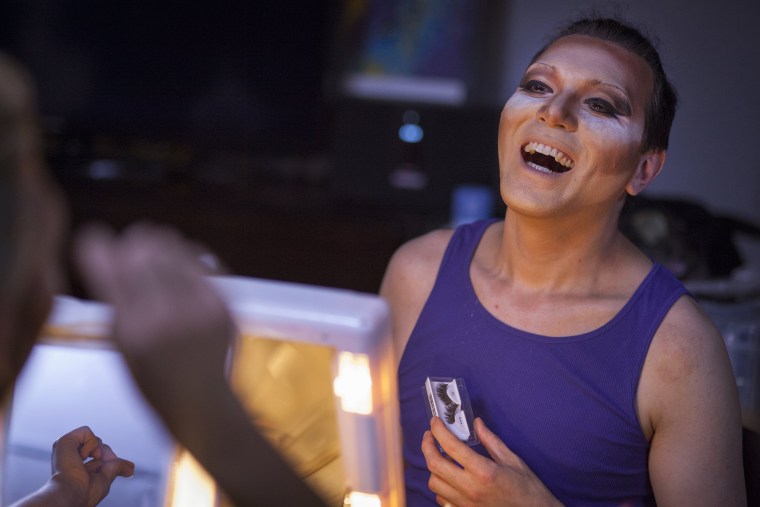
Though there were very few Asian-American drag queens at the time, Alex said that high-profile “drag mothers” and transgender activists like Tita Aida were instrumental in bringing the AAPI LGBTQ community to the forefront in San Francisco. “She’s been in our community since the ‘90s. She was the big momma personality in our city,” he said.
Alex began to volunteer at the Asian & Pacific Islander Wellness Center and eventually landed a position there up until 2011. Off the clock, Alex also helped recruit performers and advertise for Tita Aida’s show at N’Touch. But it wasn’t easy finding Asian-American drag performers.
“By the time I was already helping Tita out with ‘Club T,’ there was a desert of Asian drag queens. It was a struggle finding people to perform drag,” he said.
Alex tried to tap into the API community’s own networks, but it was as though the same people were performing every week. “If you were a young Asian queer and you wanted to be a drag queen, there were no resources, no role models,” he said. “You would go to the Castro and see all these white drag queens, Latina drag queens, and you wouldn’t see anyone like you."
In response, Alex wanted to create an all Asian-American drag troupe that would have a more permanent presence in the community. “I was at that point where I was like, if there’s no spaces we can go, I’m going to create my own space,” he said.
To continue Tita Aida’s efforts in the community, Alex officially formed the Rice Rockettes, an all Asian-American drag troupe mirrored off of Tita Aida’s Rice Girls, a smaller community-based initiative and AAPI performance group which had slowly simmered off by 2003. The Rice Rockettes made their debut in 2009 at Shangri-La in San Francisco, and in 2011, made a brief appearance on national television during the audition round for the sixth season of “America’s Got Talent.”
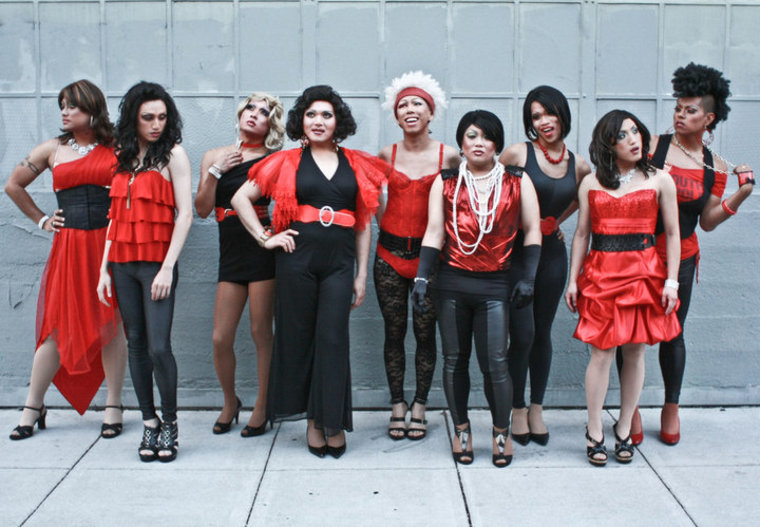
Doncha Vishyuwuzme
Chris Young remembers the night he accidentally overbooked his performance schedule. He was hoping to attend a company holiday party and still make it in time to guest DJ a show with the Rice Rockettes. In order to accomplish everything on his checklist, Young decided to transform his work desk into a makeshift vanity, filling in his eyebrows with an eyebrow pencil and putting on a camouflage beard cover--all while juggling last-minute IT problems.
“People were coming up to me asking if I could troubleshoot Java problems. They might have been taken aback by first, but they needed their issue fixed more than they were willing to walk away,” Young told NBC News.
These days, most people know Young better as Doncha, a “Pussycat Dolls reject” inspired by the pop group’s hit lyrics, “Don’t cha wish your girlfriend was hot like me?”
“You put makeup and a wig on, and it’s not me anymore. It’s a persona. I could be whoever I want."
Young credits his parents with teaching him necessary life skills (“I learned wiring and electrical from dad, and mom taught me how to sew,” he said of his father, an electrician, and his mother, a waitress in San Francisco), but admits he has not yet come out to them. Young said his parents, who are in their late 70s, understand that he dresses up, but they don’t necessarily understand his life.
“Many immigrant Chinese or Asian parents…don’t understand the concept of what gay is,” Young said. “So to get them to wrap their heads around that is very complicated.”
Despite the communication barriers, Young said his parents have helped him build some of the costumes he’s worn to shows with the Rice Rockettes and some pageants, including Runway, the pageant where he found his identity as Doncha Vishyuwuzme.
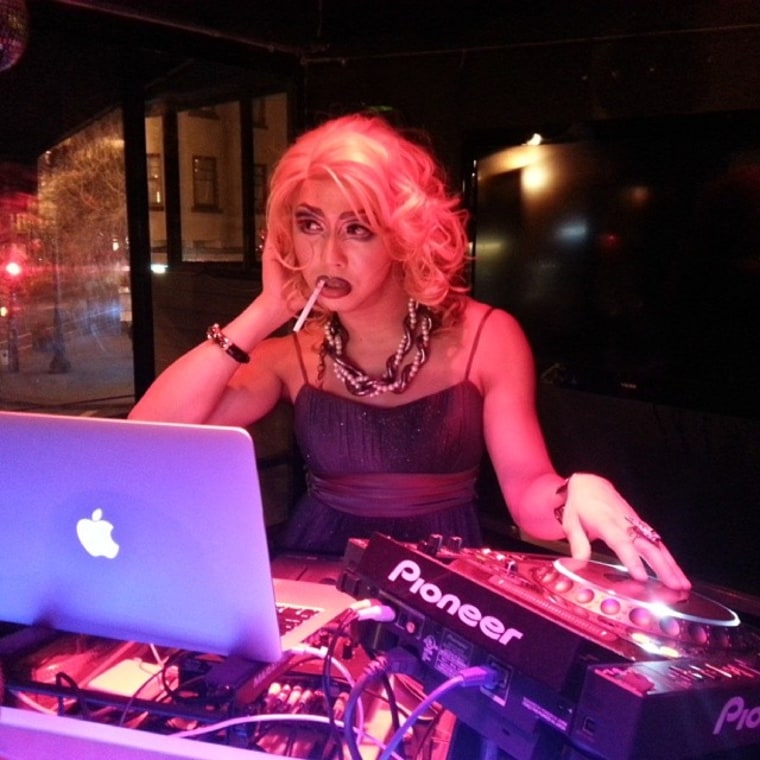
Young had originally volunteered for the organization as a timekeeper, holding up 30-second limit signs for performers, though he wanted more than anything to perform on stage. After some convincing, Young ended up performing a number to the “Pussycat Dolls,” which became one of the show favorites.
During an interview portion of the pageant, Young wore a plastic bag dress his mother had designed for him after she had endlessly bargained for plastic bags with a vendor at a flea market. “The plastic bags had a ‘thank you’ rose in the middle,” Young recalled. “She bought a thousand plastic bags for $10 dollars.”
Kristi Yummykochi
Nick Takeshi Large was reluctant about the name “Kristi Yummykochi” at first.
“I was like, 'That's cliché,'” Large, whose mother is Japanese-American, told NBC News. “Every Asian queen has to have an Asian name to show her Asian identity.”
The name first came up during a brainstorming session with the Rice Rockettes when someone had suggested names that would be based off of one’s racial identity. He eventually agreed on something along the lines of Kristi Yamaguchi, the famous American figure skater.
Large joined the group two years ago after meeting Rice Rockette member Lychee Minnelli at an AAPI event. With a dozen questions and some hesitation, Large went on to perform his first solo drag performance as Kristi at a magazine launch party with the troupe in Chinatown. He donned a short bob with blue highlights to match a formfitting blue dress that cut off just above the knees. He left his pink bra exposed and threw on a black leather jacket to complete the transformation.
“I was going for the bad bitch look, and I did Beyonce’s ‘Grown Woman’ for my first solo,” he said.
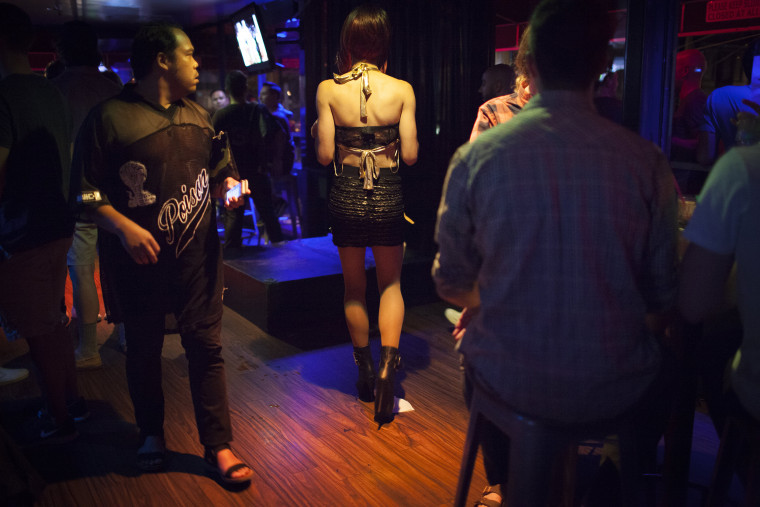
Large said most of the feedback from the community has been positive, though there have been times he's been catcalled on the street or an occasional passerby would use homophobic slurs to refer to him. “[San Francisco is] a very queer-friendly city,” he said. “I don’t find myself too worried. I’ve done martial arts most of my life.”
Over the years, Large struggled to understand his different identities--from his biracial identity to his sexual orientation. “Doing drag is something I would have never considered. If you asked in high school or college, I would think it was ridiculous,” he said.
But drag, he acknowledged, has helped him come to terms with his true identity without feeling the constant pressure or need to feel judged. “Part of the reason I do drag was I used to have aspects of my life...I repressed so much. I tried not to appear a certain way,” he said. “I did drag as a way to explore that side of femininity something I was previously afraid of.”
